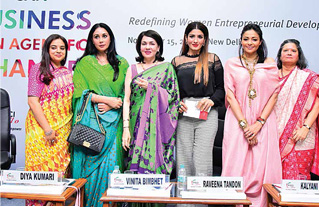
They say it’s a man’s world, but Indian women are taking the bull by the horns. They’re working overtime to take their start-ups to the pinnacle of success. Yet, not all are succeeding. What challenges do they face and how can they overcome them?
Entrepreneurship is all about launching and running a business. It generally begins as a startup. Until a few years ago, it was considered a man’s domain, but the tide has begun to turn, and with PM Narendra Modi’s Stand-Up India push, it is gathering momentum. Today the startup scenario is experiencing a paradigm shift with lots of women boldly setting up their own businesses, giving stiff competition to men.
But if you think they’re having a cake walk, you’re wrong. In fact, breaking age-old stereotypes and working effortlessly is quite a task for many. They face challenges not typically shared by their male counterparts--in finance and funding, marketing, access to resources, mobility, and, most importantly, obtaining the support of their husbands and in-laws.
To shed light on some of these issues, Delhi’s FICCI Ladies Organisation (FLO ) organised an interactive panel discussion recently to explore the theme ‘Can Business be an Agent for Change?’ On this occasion, it also launched a startup initiative titled ‘Dyuti’ (a synonym for Goddess Lakshmi) which it hopes will generate gainful entrepreneurial opportunities for women in the jewellery industry.
To discuss key challenges women entrepreneurs face and how they can overcome them, FLO invited three very successful and articulate businesswomen from three different fields--politics, cinema and fashion—represented by Princess Diya Kumari (Rajasthan), Raveena Tandon (Maharashtra) and Kalyani Saha Chawla (Bengal) respectively. The idea was to not just discuss issues they face but also suggest ways to overcome them. But before taking it up, let’s just take a peep into the professional and personal lives of these three gorgeous ladies who have gone through all these stages in their distinguished careers.
A BJP legislator from Rajasthan’s Sawai Madhopur constituency, Princess Diya Kumari belongs to Jaipur’s illustrious royal family. The only child of erstwhile Maharaja of Jaipur, Sawai Bhawani Singh and Padmini Devi, she studied in Delhi and Jaipur and later did a course in decorative arts from London. Personally groomed by her grandmother, the legendary beauty Rajmata Gayatri Devi, she currently manages her family businesses and heritage which, among other things, include City Palace, Jaipur (that’s also partly her royal residence) and Jaigarh Fort, Amber and two trusts and two schools. She also runs three palace hotels in Jaipur and Mount Abu. Mother of two sons and a daughter from her marriage to Maharaja Narendra Singh Thikana of Shivad, like her grandmother, she finally plunged into politics in 2013 when she formally joined the BJP before a crowd of two-lakh people in the presence of the then Gujarat CM, Narendra Modi, BJP president Rajnath Singh and Rajasthan CM Vasundhara Raje Scindia.
Raveena Tandon doesn’t need any introduction because we all know her as the ‘Tu Cheez Badi Hai Mast Mast’-girl of film Mohra who gave us box-office hits like ‘Dilwale’, ‘Khiladiyon Ka Khiladi’ and ‘Ziddi’, to name a few. Not many, however, know that she’s also a producer, PE TA activist, social entrepreneur, TV host, newspaper columnist, an ex-model and former chairperson of the Children’s Film Society of India (2003). A veteran Bollywood star of over 25-years’ standing, Raveena got high critical acclaim for her mesmerising performances in some hard-hitting women-oriented films like ‘Shool’ (1999), ‘Sandhya’ (2002) and ‘Satta’ (2003). But the film that won her the prestigious National Film Award for Best Actress was Kalpana Lajmi’s ‘Daman’ (2001) in which she played the powerful character of Durga Saikia, a lower caste girl from a poor family. Daughter of renowned producer-director Ravi Tandon who made popular films like ‘Khel Khel Main’ (1975), ‘Anhonee’, ‘Jawaab’, ‘Majboor’ and ‘Khud-daar’ (1982), Raveena is married to film distributor Ravi Thadani (2004) and is mother of Rasha (2005) and Ranbir vardhan (2007). Incidentally, she is also mother to two other girls she had adopted as a single mother in the 1990s.
As Vice President of Dior’s marketing and communications ventures in India, Kalyani Saha Chawla has been overseeing the world’s most luxurious brand’s market positioning, PR activities and product placements with high profile Indian celebrities for over a decade. A prominent page-3 personality within India’s elite society circles, Chawla is an experienced retail and manufacturing entrepreneur. She began her career as a marketing representative and correspondent for the Indian Express, looking after their four very diverse magazines, following her graduation in Commerce from Chennai. Having launched a leather-crafting business and bric-a-brac boutique in Calcutta, Chawla moved to Delhi to launch her own leather goods exporting company in the late 90’s-- following the break-up of her marriage to hotelier Sanjeev Tyagi - and met Vishal Chawla of Ravissant fame. She started designing jewellery together with Vishal for export and as it started making big, Kalyani had a fairytale kind of marriage with him in 1998 against stiff opposition from Vishal’s family. A patron of art and fashion, Kalyani is today a proud mother to her teenage daughter Tahira Tara.
Breaking age-old stereotypes and working effortlessly is quite a task for many. They face challenges not typically shared by their male counterparts--in finance and funding, marketing, access to resources, mobility, and, most importantly, obtaining the support of their husbands and in-laws
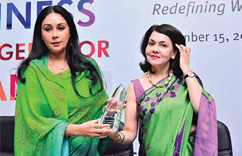
Moderated jointly by Vinita Bimbhet (President, FLO ) and Bela Badhalia (FLO Governing Body Member and Past Chairperson of FLO ’s Jaipur Chapter), the jam-packed, hour-long panel discussion turned out to be quite exciting for over 200 women entrepreneurs, many from Jaipur. Corporate Citizen brings to you excerpts of this thought-provoking discussion which not only gives you a peep into the lives of these celebrity entrepreneurs but also shows how they faced these challenges and wrote their success story
Initiating the session, Vinita Bimbhet said, “We all know that unleashing the power of female entrepreneurship can have a dramatic effect on a country’s economy. Statistically speaking, India’s 2025 GDP can increase from 16 per cent to 60 per cent simply by enabling women to participate in the economy on par with men. The only way to achieve this is to have more and more startups by women entrepreneurs and thereby more employment opportunities for women and that’s what we at FLO keep trying. But we find that family support turns out to be quite a big issue for many women.”
Taking it forward, Bela Badhalia, intervened, “So, let’s begin with Diya Kumari to know if business could be an agent of change for women?”
Rooted in reality and totally unspoilt by the glamour of royalty, Diya Kumari said, “It definitely can be an agent of change for women and I’m saying this with my own personal experience. I represent Sawai Madhopur constituency which is a very backward area. Though we have a tiger sanctuary, industrial development has been next to nothing because of obvious environmental concerns. There is a huge unemployment problem too.”
“So I began working with the poor women of my constituency including those in the rural areas to try and include them in the economy. We started with just 10 women because there were many other problems as well to attend to. We have child marriage. We have female infanticide and there is acute lack of education, especially among women who don’t go to school after a certain age. So I started off with a skilling centre. Women there wanted me to help them. They wanted jobs. They said we want money in our hands because we’re not respected in our houses. We don’t bring in anything. So we’re not treated well. I therefore thought and decided to give them skills--basic skills like embroidery, stitching and making household handicraft products. We started teaching them that and now from ten women, we have more than 300 women who are, thankfully, doing very well economically as we’ve linked them up directly with retailers, etc. A chain has been established whereby their talent in handicrafts has been linked across the market needs and a reasonably profitable economic activity has begun.”
‘India’s 2025 GDP can increase from 16 per cent to 60 per cent simply by enabling women to participate in the economy on par with men. The only way to achieve this is to have more and more startups by women entrepreneurs and thereby more employment opportunities for women’ —Vinita Bimbhet
“Seeing the market response, we encourage more and more women entrepreneurs to come forth and help us in this endeavour. We need all the help we can get. Women definitely have what it takes to run businesses,” she concluded.
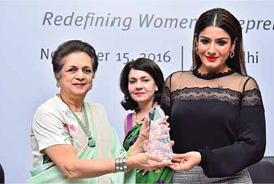
Intervened Raveena Tandon, “I’ve observed something very, very important in what Diya just said. When we women meet and talk of empowering rural women, we often miss this point that rural, uneducated women are not treated well in their homes because they don’t bring in money. So, let’s understand that the respect factor and the confidence are extremely important for women. More than men taking that responsibility, it is very important for them to take up their own responsibility. Therefore, the idea of helping such women through skilling centres was a great initiative which will go a long way in making them economically independent and thereby contributing more significantly to their family earnings and getting due respect from family members as well.”
Added Kalyani Saha Chawla, “Economic independence is indeed the most important thing for a woman. I know it from my own experience because my husband and I were separated when my daughter was barely two years old and it was very difficult. It happened primarily because of finances. I left my marriage on this very issue. I left him without a single penny of alimony from a very, very wealthy family I had married into. Although I’m doing business with my husband because we’re best friends now, it wasn’t easy at that time. People ask me what keeps me going and I tell them that the only motivation behind all my businesses has been my daughter Tahira Tara who is 17 now. I knew my daughter was my responsibility and will be for the rest of my life. She has always been my driving force. Today I’m very proud of the fact that I’m bringing up my daughter without making any compromises on anything. I educated her in one of the best schools in England.”
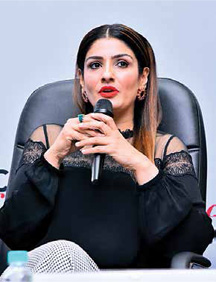
Chawala: You’re right because being a mother while running a business is indeed very challenging. But there are ways to strike a balance. I was very fortunate that I had the full support of my parents. My mother has been the biggest stabilising force in my life. She gave up all her enjoyment to baby sit my daughter for 10 years when I was in Kolkata! I don’t know what I would have done without my mother. If I’m financially independent today, it’s largely because of my support system and that’s extremely important for all women. No matter how comfortable you may be, no matter which family you come from, the real wealth comes from this mental space because your real confidence comes from there. I’ve been working with the best luxury brand in the West and at the same time, I’ve recently launched my new company, Koi Communications, basically a media communication firm. Dior is obviously a part of it, but that’s not all. I’ve also launched two more businesses. One is a fashion website called Lulu & Sky which ladies will love because my target audience is the 15-to-50 age group because today 15-year-olds are dressing like 50 and 50-year-olds want to dress like 15. So I’ve covered them both. The other is a silver business which I’ve launched with my ex-husband. And, if today, at this age and stage, I’ve started these new businesses, it’s not because of my wealth but because of the way I lived and that comes from an independence I have earned--an independence of thought and independence of mind. No wonder, I lead a life which most people may find enviable, but I tell all my young friends that if you really want to enjoy life, it’s so important to be financially independent.
Tandon: I’m in this industry by default. I never had any dreams of becoming an actress. In fact, when people asked my dad, a producer-director, when he’d launch me, he’d just laugh. This was because Mahesh Bhatt had also launched his daughter Pooja Bhatt. But my dad would look at me in disbelief and say, “Isko? How?” I was little plump. I still am, but in those days I was roly-poly and a little ladoo like. Even in my class, I was a back bencher, not wanting to put up my hand even if I knew the correct answer because I was conscious that everyone would look at me and I’d be teased by the mean boys and girls of my class. But I’ve been very stable because of my family environment. My dad always made us work to get things. Vacation time meant work—washing of cars would fetch you ₹10/- and so on. I was always treated equally with my brother on everything. If he wanted to ride a bike, I was also taught how to ride a bike. I even knew how to change the tyres of my car in case I was stuck somewhere with a puncture. And, for quite a while, I was a tomboy. Ekdum bindaas. My husband always says, ‘maine shaadi karke tumhe ladki banaya,’ because I was always like that, and till date, I’m always ready to fight my own battles. So, family support is important, but the fact is that you need to stand up on your own feet. If you want to do something, it must come from within. Be yourself, and have confidence in who you are. I’ve also learnt it the hard way. But I know if I have to save my business interest, I have to defend or fight for it. I don’t care if in the process I’m seen as aggressive.
Chawala: I totally agree with Raveena. If I’ve taken a decision, I go for it. It doesn’t bother me as to how people will see me because there is somebody up there who tests me constantly and blesses me with good fortune.
Kumari: Oh yes, I’m lucky that way. My parents always backed me, though in Rajasthan, they don’t, really. They’re very conservative in their thinking. They still are, especially in Rajput families. But my parents treated me like a boy, like a son. There was no difference. For them, I was everything and they supported me in everything I did, right from looking after the family businesses, museums, schools--which by the way I started on my own, taking inspiration from my grandmother—the late Gayatri Deviji—because I wanted to do something in education in Jaipur and my father was most encouraging. Even when I was growing up, I was totally free to do what I wanted to do. By the way, I chose my own husband! That’s not very common in our state, in our culture, but I was given the freedom to take my decisions, make my own choices and be responsible for them as well.
‘In today’s world, having a good product is not enough. You also need to market it well. You also need good distribution networks and money collection processes. Even if you don’t have a store, you can run a business sitting at home. You can do it digitally. All you need is a laptop to scale up your business’ — Kalyani Saha Chawla
Tandon: This question has a very long answer because it’s a long story but I think my story is more or less the same as is of every woman connected with the film industry. As you know, when our film industry started producing films, initially men used to enact women’s roles. We had male actors dressed and dragged with long wigs and hideous costumes in the role of women. Slowly and steadily, women came and evolved in the industry and today they’re in a commanding position.
Initially, every decade used to produce at least one prominent woman-oriented film. For example, there was a Jhansi ki Rani in the black and white era, followed by an Anarkali, then came a Mother India followed by Mughal-e-Azam. Coming down to more recent years and jumping straight to the 90s, you saw some of my own films like Satta, Daman and Shool which had very strong women characters. In fact, I even won the national award for Daman. These films showed stories of empowered women and that’s what the trend is even now. In recent times, you saw films like ‘Mary Kom’, ‘Kahaani’, ‘NH10’ and a lot others. In fact, in two of my upcoming films ‘Maatr’ (The Mother) and ‘Shab’ (The Night), both based in Delhi, I’m playing very strong women characters. Maatr in particular deals with the issue of violence against women and how our justice system is failing them. So, our cinema has changed over the years. Today we have some great women directors like Tanuja Chandra, Farha Khan, Kalpana Lajmi and Sai Paranjape who made wonderful films like ‘Katha’, ‘Sparsh’ and ‘Disha’, etc. Their cinema is taken very seriously. But that’s not all. Today women are also heading lots of movie production companies like Eros, Balaji, Times Movies and so on. I’ve seen the advent and also the increasing corporatisation of cinema which is helping us make meaningful films. So, yes, it’s a win-win situation for women but there is still a long way to go and I’m sure soon the gender inequality in Bollywood will be a thing of the past and a right balance will emerge. But let’s not look at it as an issue of gender equality alone. Let’s also give credit to merit and hard work because women have worked very hard to claim this position.
Tandon: No, it’s a fiction film and not inspired by Nirbhaya’s case. But since you asked this, let me tell you. A few days back I had met Asha Devi, mother of Jyoti Singh or Nirbhaya. Her wounds are still fresh. She was in tears because even four years after the tragedy, the death penalty awarded to the four offenders has not been executed. Just think, if this is true for the most-talked about case which stirred the conscience of the nation, what can you expect in other cases?
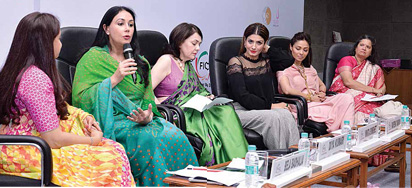
Chawala: In today’s world, having a good product is not enough. You also need to market it well. You also need good distribution networks and money collection processes. Even if you don’t have a store, you can run a business sitting at flyhome. You can do it digitally. All you need is a laptop to scale up your business. But you need family support which is very, very necessary. If your mother-in-law and husband keep asking you, “Ye kya kar rahi ho,” then it becomes difficult. So, you need to involve everybody, because we don’t just marry a guy. We marry a whole family, the whole society. If you have their support, then doing business becomes easy. But today it has become very technical and competitive. I’m not discouraging anybody, but today, it’s not the same thing as I had in my time. Today, you also need a lot of investment and other things, depending upon what you’re doing, but raising funds or getting a loan from a bank is not that easy.
Bimbhet: Here I must intervene to tell you that FLO has a platform called Swayam where we give you consultancy, mentorship, finance, legal advice, a place to work at and an e-commerce platform like what Kalyani just said. You can put it online and just sell it. We also have an online platform as we’re doing everything to encourage women entrepreneurship.
Chawala: That’s amazing.
‘We’re certainly breaking the glass ceiling in many areas, especially in professional careers, be it flying fighter planes or going in combat mode or taking part in artillery operations. This is the right time to give our women opportunities. It’s the time to support and encourage women entrepreneurs because entrepreneurship is ingrained in our DNA. It’s all about discovering your own inner ‘Shakti’ ‘ - Raveena Tandon
Tandon: I honestly think that all women are born entrepreneurs. I strongly believe that we manage our homes, we manage our children, we manage our husbands, we manipulate our in-laws, we enjoy our parents and give them all our love. We manage the whole moolah coming into the house. We make our own home budgets. We bargain with our ‘bhajiwala’, ‘machhiwala’, ‘doodhwala’ and the rest and still save money. We’re far better at managing people. We’re better communicators. We’re better at multi-tasking. We also know how to manipulate, but besides being really smart at knowing how to do and what to do, you’ll be surprised to know that in India, 30% women today are working at very senior management positions in the corporate world, while globally this figure is only 24%. So, that way, we are much ahead of the so-called developed countries who call us the third world, though we’ve had a woman Prime Minister, many women CMs and even a woman President in our country!
Secondly, though women are taken very seriously at senior positions, it’s not the case at middle- level management. That’s why those starting small businesses or trying to become entrepreneurs need full encouragement, especially if they’re doing it from home. Giving such startups a helping hand is extremely important to bring that percentage up.
Thirdly, I do feel that India right now is at a point where women are emerging as leaders in every sector. I won’t say they’re superior because it’s not a male-female kind of a battle, but we’re certainly breaking the glass ceiling in many areas, especially in professional careers—be it flyhome ing fighter planes or going in combat mode or taking part in artillery operations. This is the right time to give our women opportunities. It’s the time to support and encourage women entrepreneurs because entrepreneurship is ingrained in our DNA . It’s all about discovering your own inner ‘Shakti’. Each one of us must discover that because there is a ‘Devi’ in all of us. So, just go out there and give your best shot and, like I said, everyone can stand up and be counted.
Kumari: Very similar to what Raveena said. All women have it in them. We’re genetically made like that and it is just that we don’t realise our potential. We’re not given the opportunities, not enough encouragement from families, mostly by men and mothers-in- law. But, given the right opportunities, platforms and direction, we can do as much as we want to. Sky is the limit.
Chawala: I also agree with Raveena because their passion for work, their excellence on the job and the changes they have wrought have taken women to the top of their game. They’re changing the rules every day. So, whether you like it or not, we’re there. We’re the only beacons of hope today and we deserve a standing ovation.
by Pradeep Mathur